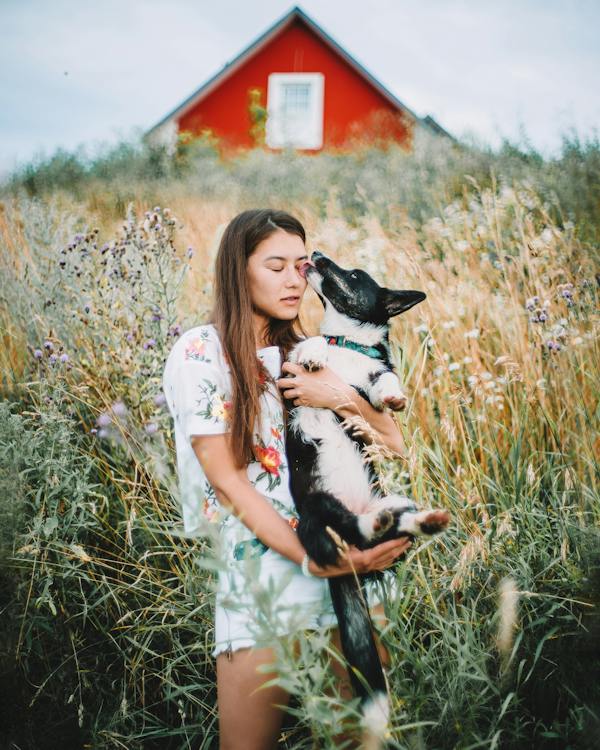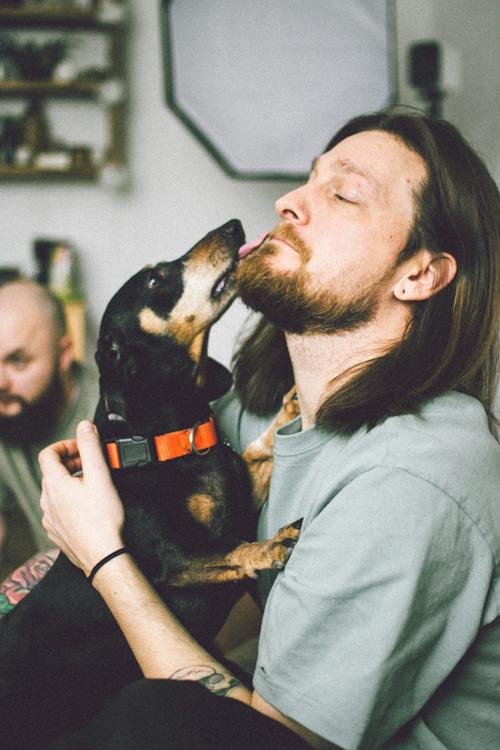Gentle licks across your cheek or chin make perfect sense as your pooch’s way of showing affection. But what if Fido goes overboard with the sloppy kisses, poking your face insistently with their tongue or practically mauling you like their favorite flavored ice cream cone? Ravenous lapping coupled with pushy body language merits decoding to understand what’s driving such forceful displays.
Overeager Greeting Rituals
Some dogs just get so uncontrollably excited when welcoming owners home that they temporarily lose grasp of grace and boundaries. What manifests as aggressive face licking constitutes exuberantly playful energy, not true aggression. Be patient reminding overzealous greeters to sit politely before giving proper fusses to avoid face attacks.
Attention-Seeking Behavior
Licking owners serves both bonding instinct and the fact that people usually quickly intervene by engaging with lick-happy dogs. For bored, lonely or inherently needy canines not getting sufficient daily interaction, sloppy ambushes effectively hold your gaze and force play sessions. Make sure pups receive adequate exercise, enrichment and quality time from all family members so they don’t resort to acting out for notice.

Stress or Anxiety
In the absence of preferred control outlets, anxious dogs turn to frantic lip-smacking releases like face licking for comforting emotional grounding. If your dog only licks faces aggressively when confronted by environmental triggers like strangers approaching during walks, separation when left alone, or visiting unfamiliar places, address the underlying insecurity through counterconditioning and confidence building.
Medical Reasons
While most hyper licking aims at attention or stress relief, medical factors can also heighten this impulse. Skin irritation from fleas, food allergies or contact dermatitis makes dogs lick themselves initially, then redirect onto what’s readily available – your face. Similarly, nausea, dental pain, and neurological disorders prompt obsessive licking too. Veterinary workups help.
Curtailing Over-the-Top Licks
For all their enthusiasm, aggressive face-licking dogs mean no harm, but their unpleasant habits spread bacteria and get old fast. Use positive reinforcement training to set and enforce boundaries around proper greeting behaviors. Redirect excessive energy into puzzle toys instead and make sure pups have enriching outlets meeting their needs. Most importantly, get to the root motivator, whether that’s anxiety, illness or just a simple need for engagement. Soon those uncontrolled tongue tornadoes will calm into cute chin licks you can cherish rather than avoid!

Frequently Asked Questions
My new rescue constantly attacks my face – what does this mean?
Shelter dogs often desperately crave affection due to previous neglect. What seems like aggressive licking more likely reflects your rescue exuberantly, if sloppily, trying to shower you in grateful kisses in hopes of securing their new home. Patiently retrain them.
Why does my dog only lick my child’s face aggressively?
Kids often squeal, give dramatic reactions, laugh and roughhouse in response to dog licks. To dogs, this signals highly rewarding play. Stop this cycle by having kids stand still and calm whenever licked. Only give affection after dog sits politely not jumping.
How do I stop my dog’s face licking without punishment?
Use positive reinforcement by redirecting to a toy when they attempt to lick, coupled with calmly standing up and ignoring them for 30 seconds. Consistency allows redirection without any punishment needed. Additionally, address root causes like loneliness.
While occasional doggie kisses show pure affection, excessive face licking points to displaced energy needing an appropriate channel. Help fixate pups find suitable fulfilling outlets beyond using your cheeks as pacifiers!
